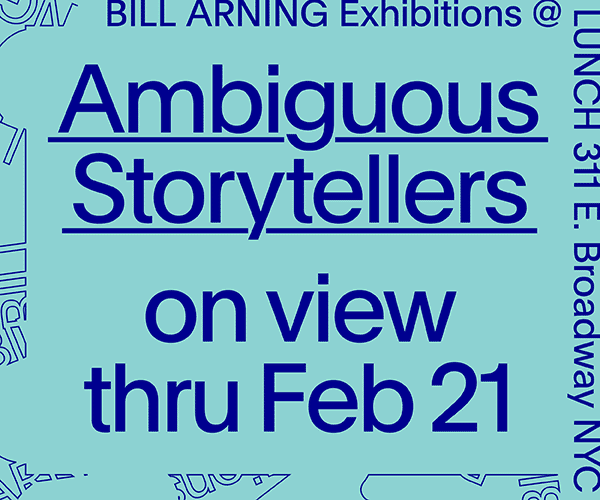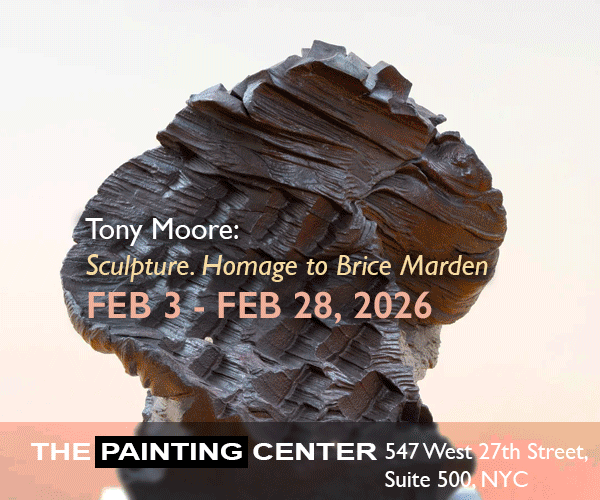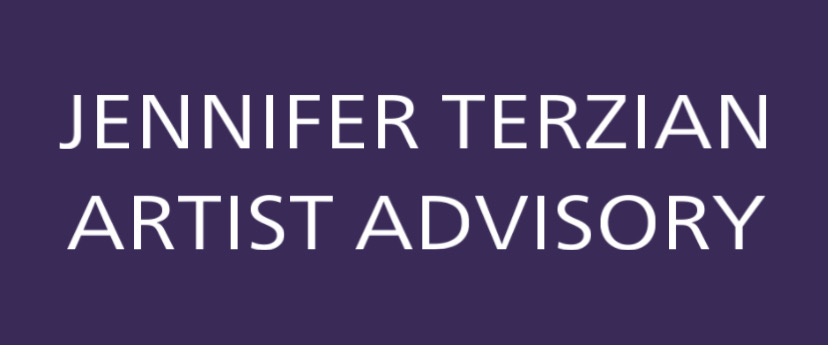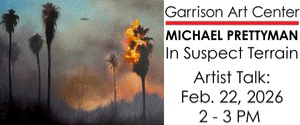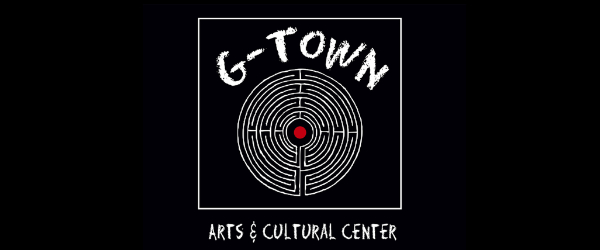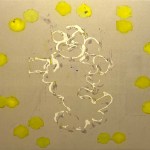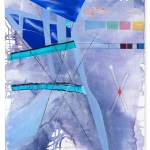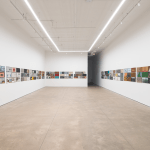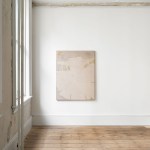The body of the artist Luke Vlerick was discovered in his Brooklyn studio on Friday morning by his studio manager, Jamal Kazi. — Ralph Zals, Arts Editor, New York Weekly

Contributed by Laurie Fendrich / Three days had passed since Muriel Redpath who had hated her given name since birth and instead liked to be called Mure had seen Luke. Now here she sat, reading the news of his death on Twitter. After several weeks without contact, had invited himself over for a studio visit and stood in front of her modest-sized, abstract paintings, hands on hips as always, babbling on about spatial phenomena and emotional memories. Suddenly, he sidled up to her and clumsily began nuzzling her neck. Luke was a womanizer, of course, but since their breakup twenty years ago they’d been strictly friends — good friends, but only friends. Thankfully, Luke knew how to take no for an answer.
I have to leave anyway. I have a doctors appointment, Luke said rather unconvincingly.
Mure laughed. I thought you never saw doctors.
I dont, Luke said. I close my eyes every time.
Luke had been a tall and lanky point guard on the small-college basketball team when Mure first met him. They were working next to one another in a beginning painting class and fell in love while learning to mix colors. Two years later, when Luke went to New York to enter an MFA program in painting paid for by his wealthy parents, they broke up. When Mure graduated two years after that, she had maybe a hundred dollars to her name and her parents had neither the money nor the interest in helping her become an artist. She moved to New York anyway, got herself a job at a restaurant, and painted on her own in the shabby apartment she shared with two other newbie artists. A year later she called Luke, who by then had a new girlfriend; they rekindled their friendship, albeit without the romance. Though Luke didn’t stay with this lover for long, or any of the ones that followed, his friendship with Mure endured. Which was odd, given that Mure committed herself more and more to purely abstract painting, while Luke tacked toward conceptual art. Their careers had different trajectories as well: Mure ended up supporting herself as an artist by teaching art to junior high students, while Luke found the waters of fame and fortune.
To Mures gimlet eye, Luke’s early success wasn’t hard to explain. Within a couple of months of arriving in New York, he’d found himself a job as an assistant in the studio of the well-known artist Robert Grange; within six months, he was promoted to studio manager. Luke turned out to be quite the shape shifter, one who knew how to please everyone, especially the collectors and museum curators who paraded through Granges studio. It wasn’t long before those very same collectors and curators found their way to Luke’s studio to buy his work.
There was no denying that by gluing hundreds of dried banana peels and No. 2 yellow pencils with pink erasers into a giant grid formation on super-sized wood panels, and then talking about the results in terms of feints on a basketball court coupled with critical theory, Luke had come up with a winning formula. Mure would never say it, but Luke’s cockamamie ideas notwithstanding, there was something powerful and snappy, even stunning, about the way the enormous things looked. All that was needed for his career to take off was for the mega-dealer Angus Awles’ to take him on, which he did the very first day he visited Luke’s studio.
When woke culture and identity art hit the art world, Luke’s career as a white male artist coming from a line of Caucasian ancestors going back to cave dwellers looked as if it would dissipate into the ether. What with the tectonic cultural shift away from inside-art-world takes on art toward social contextualization, his art suddenly looked as self-indulgently clever as it probably really was. Implausibly, fantastically, stupidly even, he somehow reinvented himself as an artist practicing institutional critique. To Mure, the claim was absurd. But to the respected art critic Ralph Zals, who wrote about the exhibition marking his debut as a socially conscious artist, everything made sense. The dried banana peels became symbols of white male oppression (“desiccated penises), while the sharpened yellow pencils with their small pink erasers mutated into deep visual analysis and an erasure of systemic racism.
Meanwhile, Mure and several of her friends in The Painted Way, an East Village co-op theyd formed a decade ago dedicated to abstract painting, clung together in their closed clubvisiting each others studios, talking about the meaning of their paintings, bemoaning the predicament of painting pictures without having any audience other than themselves, curating various exhibitions around town, and each year ponying up dues to keep their gallery afloat. To a person, they had stayed the course with abstraction painting circles, squares, rectangles, funny triangles, odd organic shapes, stripes, lines, wiggles, dots, dabs and dribbles, which they believed offered beauties not found anywhere else in the man-made world.
Jamal Kazi, Luke’s studio manager, had recently accepted an invitation to join the painting co-op. Mure told him it would give people the opportunity to finally see his beautiful paintings, while Luke said it would mean he’d never have a serious career. Jamal used mostly rich English racing green, ivory black and titanium, and painted soft shapes suggesting shadows on a moonlit snow. Mures best friend from the co-op overlapped transparent fabrics to construct abstracted, free-form collages mounted directly on the wall. (These caused great consternation within the group, with several meetings devoted to arguing over whether they should be called paintings at all.) Another member, Aaron, whom Mure had gotten a job working as an assistant in Luke’s studio, made paintings consisting of hard-edged indigo and ivory black vertical stripes covered in a glossy varnish. Mure, meanwhile, had spent the last decade painting wide, boldly colored swooping lines that her mother repeatedly told her were just a lot of nothing.
Ever since Aaron had gone to work as an assistant in Luke’s studio, his bad temper and foul mouth had gotten increasingly worseto the point where Mure now tried to avoid him. Nevertheless, at the opening to Lukes most recent show at Angus Awle’s Gallery three weeks before Luke died, she found herself standing next to Aaron as they waited to congratulate Luke. Aaron slapped him on the back and said, Amazing, man. You did it. Amazing show. Mure gave Luke a hug. Luke thanked them both and then coolly turned around to talk to people who were more important to his career. Mure and Aaron took the cue and wandered over to a corner of the gallery where several members of the co-op had gathered.
Pulling down his Covid mask, Aaron addressed the group. This new work is a fucking mess. The last four weeks he kept changing his mind, and the fucking show turned into a moving target. And he kept losing it with me, as if I was responsible for his stupid ideas not working out.
Looking around at the packed opening, Aaron added, I seriously do not get all these red dots.
Mure, unable to hide her irritation, said, Luke’s show isn’t about you, Aaron. You’re just jealous. Your problem is that you hate working for a famous artist who has a line of people waiting to buy his paintings. She paused before adding, Unlike yours.
Aaron bristled. Even though Mure had helped him get the job in Luke’s studio, hed always disliked her. I am in no way jealous of Luke. Hes a talentless hack. A fucking fraud. He doesn’t believe in his art, or any art, for that matter. All he believes in is fame and money. I wouldn’t trade my paintings which, sorry everybody, have more meaning in them than anything hanging in this room for his bullshit art even for all the fame and money in the world.
Oh, I get it, Mure said. Your paintings are spiritual and full of meaning but Luke’s conceptual art isn’t. Can’t you get it through your thick head that meaning isn’t in the work, its in the mind? (Jamal had taught her this.) Just be grateful Luke gave you a job that makes it possible for you to make your own art.
After she learned of Luke’s death, Mure called and texted Jamal all day and into the night, but got no response. The next morning even more shocking news emerged. It seemed Luke had died from a fall from his ladder. He’d always had the reckless habit of scrambling up to the highest rung of the ten-foot ladder that was a permanent fixture in the middle of the studio so he could get a long view of his work. Fall from it, maybe, but die? No way.
Mure again texted Jamal, this time adding multiple eyeballs: Where are you?! Why arent you answering? Her phone was filling up with text messages from friends offering insincere condolences when Jamal finally texted back, Sorry. Can you come to my studio at noon?
Mure and Jamal had hit it off from the start. There was a spark — something that always made them search out and lock into one another’s eyes. Both loved the mystery of abstract paintings ineffable meaning and were convinced it conveyed universal truths. They talked about the emotions it elicited, its air and spatial depth, and especially the infinite nature of color. And they both saw their work as connected to early modernists Mure to Kandinsky, Jamal to Juan Gris.
Unlike Mure, Jamal had had a superb liberal arts education at a select liberal arts college, which hed attended on a full scholarship. He taught her about Plato’s forms, as well how Kant’s philosophy freed art from literary content of any kind. Curiously, although it might have advanced his career, Jamal never spoke of his life, work or even his ideas in terms of his experience as a person of color at least in front of her.
In the gloaming of a spring day near the end of their Covid quarantining, they’d sat in the park celebrating their double vaccinations. As usual, they talked about painting. Mure looked into Jamal’s eyes and whispered , You and I are so different but really were the same. We both believe our paintings are truth. They aren’t. They’re illusions, but this isn’t a bad thing. Believing in them makes our lives have meaning. As for the rest of the world, forget it. No one outside our little world of abstract painting gets what we do. He’d squeezed her hand tightly but held back from making more of the moment.
While on the subway to Jamal’s studio, Mure read on her phone many encomiums about Luke Vlerick was one of the boldest of his generation, Vlerick’s brilliance lay in juxtaposing nominally unrelated objects in a way that made everything seem necessary, even logical, Younger artists were drawn to Vlerick’s piercing critiques of white privilege and the elitist museum and gallery world. To Mure, they were nothing but oily word salads mucking up understanding either Luke or his art.
In his studio, Jamal and Mure sat on two chairs in front of the large green and white painting he was working on. He looked exhausted, and his fingers were fidgety.
Tell me what happened, Mure said softly.
I dont have a clue. I really don’t, Mure. I only know there’s no way Luke died from a fall from that ladder. The first thing I saw when I walked in was him lying on the floor. I knew right away he was dead. I called the cops, and they were there within minutes. They looked at all my IDs and then for about an hour they asked me a pile of questions. Like, who I was and what I was doing there. I was sure they’d take me to the station for more questioning, but for some reason they didn’t.
Jamal stared at his painting. I tried to explain that the ladder was always in the middle of the studio and that Luke always sat on it to study his work. I could tell that the more I explained this the more they thought I was lying. Luke’s habit sounded ridiculous even to me. I botched things even more by adding that he climbed up there in imitation of a photo he’d seen of Ad Reinhardt sitting on a ladder in his studio. It went way over their heads. I’m here to tell you white cops don’t take kindly to that sort of thing coming from a Brown man.
Jamal then added, I know they think I killed him.
What?! My God, Jamal, you think he was murdered?! The realization that Luke might have been murdered landed with a thud on the floor of her boneheaded mind.
Well, yes, maybe. I don’t know. But Mure, this is the bad part. I’m pretty sure the body was moved. It was lying too far from the ladder for him to have fallen off and landed that way, and in a funny, relaxed position. I’m sure the cops noticed this as well. The autopsy will surely show he was murdered and they’re going to think it was me. It makes me sick, like I’m going to throw up any second.
Calm down,Mure said. You’re being ridiculous. There’s no way they’ll think you murdered Luke. Ill testify you two were best friends. But I’m sorry, I have to ask, Jamal: Do you have an alibi? Mure was aghast to hear herself ask this question, which must have come from the British murder mysteries she always watched on television.
Jamal looked at her. Really, Mure? Do me a fucking favor and wake up from your tidy little white world. You think an alibi would help a Brown man like me? Alibis are for white people like you. Im going to be the number one suspect and Ill be hauled in for questioning and charged with murder.
Mure had never heard Jamal talk about his racial identity in such a brutal way. It made her feel that her closeness to him was a total illusion. It wont go that way, Jamal, Mure said, reaching out to hold his hand. When it comes down to it, Aaron will be the prime suspect, not you. Hes the one who’s always fighting with Luke, not you. And you both have keys to the studio, after all.
Mure then asked, Did a coroner come or anything? Clearly, she was discovering things to ask from watching her detective shows with their myriad models for how to behave in the face of murder .
Yeah, definitely. The place was crawling with cops and people with ID tags hanging around their necks. Ive never found a body before, so I don’t know whats supposed to happen after you call 911. But before they let me go, they asked for a list of people who could vouch for my whereabouts for the last 24 hours. Jamal paused, then added, By the way, you’re one of those people.
A surge of I-dont-want-to-be-involved coursed through Mure’s body. Could she really vouch for Jamal’s whereabouts during all those hours? What if Jamal were actually guilty of murdering Luke? To save him shed just plain have to lie.
Trace your movements for me, Mure said matter-of-factly.
Jamal was annoyed at the way she slid so easily into being a make-believe cop, but he complied. OK, its simple. The night before Luke died, when I left the studio at about 5 o’clock, he was busy working on some drawings. From there I went to Sarah’s opening at the co-op, where I bumped into you, as you must remember, and a whole lot of others who will definitely remember seeing me. Then I went to the deli to grab a sandwich to take to my studio, where I worked until around midnight. After that I went straight home. The next morning I got to Luke’s studio around my usual time, which is nine. That’s when I saw his body.
Mure guiltily recalled that yes, of course shed seen Jamal at the gallery. They’d even talked and joked about how Sarah’s new work was so-beyond boring.
The cops asked me if there was anything unusual going on the day before he died, Jamal said. I said not really, not yesterday in particular, but I told them that for the past couple of weeks something seemed off about him, like he was depressed.
Jamal looked sharply at Mure for confirmation. You and I talked about this remember?
Yes, of course. Yes, yes, I remember, Mure said hastily. We both thought something was worrying him. Mure wasn’t at all convinced this was true but was eager to affirm what Jamal said.
One thing more, Mure. Luke got some calls during the three weeks before he died that he took in private, in his office, which isn’t what he normally did, Jamal said. One time I peeked at his phone and saw hed had calls from his mother and a few from a medical group. It was weird, the doctors. He never went to doctors. He always said disease was all in the mind. Something was going on, but I’m not sure what.
Mure recalled the day he visited her studio and said he had to leave for a doctors appointment. Maybe he wasn’t just trying to save face.If Jamal were arrested, shed remember to mention this to the police.
Plus another thing, Jamal continued, The week before he died, Luke and Aaron were going at one another big time. Aaron yelled about not being paid enough and Luke kept saying so just quit already. Aaron went on about how Luke doesn’t respect any artist other than himself and told him his fame came from the fact that the art world liked shallow art. Luke was really good about it never bringing up that its Aaron’s art that’s shallow. Anyway, it was their usual drama, so I stayed out of it.
Mure froze. Jamal, its staring us in the face. It was Aaron. Aaron. Maybe he didn’t mean it, but he killed Jamal. Hes always been a hothead and hes insanely jealous of Luke’s success. Any money he came back to the studio after you left and killed him.
Mure went home and immediately texted Aaron saying she needed to see him. With what she wanted to say to him, and Covid still moiling about, she named an outdoor meeting place. They met in the late afternoon, when the meagre heat of the autumn sun was barely enough to keep them warm.
I wont mince words, Mure said. I know what happened to Luke. I know what you did. You’ve got to turn yourself in to the police.
Aaron almost gagged on his beer. Whoa, Mure, hold on a minute. Whats that supposed to mean?
Mure stared him down. I know you’ve always used your key to return to Luke’s studio to work on your own stuff in the evenings. And I know you two were fighting all the time. It doesn’t take rocket science to put two and two together. Lets just say you returned that night and got into some kind of physical altercation with Luke. The cops are going to figure this out, Aaron. Best to go to them now.
Aaron leaned back in his chair and said, OK, lets say for a minute I did go back that night. I do that all the time. That doesn’t make me a murderer. What a stupid, clich’d defense, Mure thought.
There was a short pause before he added, Lets just say I did that. OK, yes, I actually admit I did do that. But nothing happened, Mure. I swear. Nothing. The whole time I was there I was working on my own art and Luke paid no attention to me.
It amazed Mure how fast Aaron buckled, but it was only halfway. I don’t believe you for a minute, and neither will the police. Aaron, you wont be able to cover this up. Tell me what happened, and Ill help you get out of this mess. Seamlessly, Mure had moved from abstract painter to interrogation detective to lawyer in one 24-hour period. It crossed her mind that she should be on City Confidential.
Aaron leaned toward her. Lowering his voice, he said, Luke and I got into a fight. But Mure you have to believe me when I swear it wasn’t physical. We were doing our usual crazy act Luke screaming down at me from up on that fucking ladder, when suddenly he toppled forward onto the floor. I mean, just collapsed, landed face down. I thought hed passed out from alcohol or something and ran over to him, but he was dead.
So why didn’t you call 911? Mure asked.
Aaron put his head in his hands. I don’t know. It was stupid. I was scared. Id never seen a dead body before. I thought if I called 911 the cops would come, and Id be blamed. I figured me not calling wouldn’t matter because he was already dead. I knew Jamal would find him in the morning, call the cops, and they’d say it was an accident.
Mure was livid. You fucking asshole! You total fucking asshole! What the fuck is wrong with you? You decided to stick it to Jamal by making him find the body? What kind of person are you? What if Luke wasn’t really dead? What if calling 911 had saved his life? What if because of you Jamal gets accused of murdering him?
I’m telling you he was already dead. I rolled him over and put my ear to his chest, felt his pulse, poked him a little nothing. As for Jamal, I felt a little bad, sure, but hes super smart and polite and a Black guy, so I figured the cops, because of Black Lives Matter and all that, would be on the alert and treat him fairly.
You’ve got to be kidding, Mure screamed, jumping up. She sat down again and, leaned her face right into his. Through gritted teeth she said, What planet do you live on? You turned a body over and you think the cops wont figure that out? Or wont try to pin Luke’s death on Jamal? And by the way, Jamal is a Brown man and he wants to be called a Brown man.
Walking away, Mure turned around and added, Either you call the cops, or I will. You have two hours.
When Mure got home she was still shaking. She repeatedly tried to reach Jamal but got no response. When her phone rang, certain it was Jamal, she answered.
Is this Mure Redpath?
Yes.
Perhaps you remember me? I’m Donna Vlerick, Luke’s mother.
Taken aback, Mure mustered a somber voice. Yes of course I remember you. Its been ages. Luke and I had such wonderful times when we were young and went to visit you and your husband. What a terrible time for you now. I am so very, very sorry.
Yes, Robert and I are devastated, Donna said. Mure remembered how wonderful Luke’s parents were, and how, unlike hers, they had supported Luke becoming an artist.
I hope you don’t mind my calling you, Donna continued. Luke gave me your cell number a few weeks back. He wanted me to have it in case something happened to him. He told us about his illness, but Robert and I had no idea it was so bad. But here I am calling for a reason.
There was a pause while Donna collected herself. We just heard from the coroner results that will be released tomorrow morning. The press has got it completely wrong. Luke didn’t die from a fall from a ladder. The autopsy shows he died before he fell from HCM. He was dead before he hit the floor.
Mure was confused. What was HCM? Had Luke been taking drugs?
Donna explained that about a month previously, Luke was diagnosed with HCM, which is a congenital heart condition that, left untreated, often leads to what had happened to him, especially if there’s any physical or emotional stress. He’d been working with physicians on a plan to treat it but died before they implemented it.
You know, Mure, Donna said, Mark Twain once said that a lie can travel halfway around the world before the truth is putting on its shoes. Please tell your friends in the art world that Luke’s death had nothing to do with all the terrible rumors I’m already reading on the Internet about him being murdered.
Mure thought about the day Luke paid her a studio visit and unsuccessfully tried to lure her into making love before being rebuffed, and how he’d then abruptly left for an alleged doctors appointment. She thought about Jamal telling her that for the past few weeks Luke had been making phone calls in private.
Lying on her bed, Mure sobbed as she remembered how shed missed all signs of Luke being ill, and how shed thought Jamal of all people, Jamal might have killed Luke, and how ready, even eager, shed been to conclude Aaron was a murderer simply because she despised his paintings. She let the waves of self-pity wash over her. Then she texted Jamal to say the coroner had ruled Luke died from natural causes, and that she needed to see him. She wanted to tell him she loved his new painting, that it was perfect for the next show she was curating, Killer Abstraction or some such title. Whatever, shed work it out later.
About the author: Laurie Fendrich is a painter, writer, and professor emerita of fine arts at Hofstra University.
Dear Reader,
Two Coats of Paint has just kicked off the 2021 Year-End Fundraising Campaign. If you enjoy reading the blogazine, catching our online conversations on Clubhouse, or following us on Twitter and Instagram, please consider donating to support programming for 2022. Thank you! Please click here to make a tax-deductible contribution.
Related posts:
Fiction: The Real, the Fake, and the Ugly [Laurie Fendrich]
Fiction: The Square Drawing [Laurie Fendrich]
Fiction: The Teddy Bears [Laurie Fendrich]

